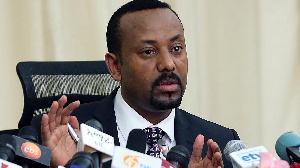Ethiopian Prime Minister Abiy Ahmed has again ruled out dialogue with the leaders of the defiant Tigray region during a meeting with three African Union special envoys.
Abiy told the envoys trying to end the deadly conflict between Ethiopian troops and Tigray’s forces that he is willing to speak to representatives “operating legally” in the region, The Associated Press news agency reported on Friday.
The meeting occurred as people fled the Tigrayan capital, Makelle, in fear of an imminent assault after Abiy on Thursday announced the “final phase” of the three-week offensive.
In a statement issued after the meeting, Abiy’s office said the government was committed to the “protection and security of civilians” in Tigray.
There was no immediate word from the three AU envoys: Former Liberian President Ellen Johnson Sirleaf, former Mozambique President Joaquim Chissano, and former South African President Kgalema Motlanthe.
The government had given the Tigray People’s Liberation Front (TPLF), who runs the northern Ethiopian region, until Wednesday to lay down arms or face an assault on Mekelle, home to 500,000 people.
The federal and regional governments consider each other illegitimate. Abiy accuses Tigrayan leaders of starting the war by attacking federal troops at a base in Tigray three weeks ago. The TPLF has described the attack as a pre-emptive strike.
AU spokeswoman Ebba Kalondo did not say whether the EU envoys can meet TPLF leaders, something Abiy’s office has rejected.
The prime minister appreciated the AU envoys’ “elderly concern” and told them his government’s failure to enforce the rule of law in Tigray would “nurture a culture of impunity with devastating cost to the survival of the country,” his office said.
Abiy, last year’s Nobel Peace Prize winner, has rejected international “interference”.
The Reuters news agency said it was unable to reach the TPLF for comment on Friday, but two diplomats said fighting raged in several areas outside Mekelle.
With phone and internet connections shut off to the region and access to the area tightly controlled, verifying claims by all sides is difficult.
There was no indication the Ethiopian military had entered the city of Mekelle. The TPLF previously said it was digging trenches around the city. Reuters was unable to verify those claims.
Thousands of people are already believed to have died amid air raids and ground fighting since the war began on November 4. The United Nations estimates 1.1 million Ethiopians will need aid as a result of the conflict.
The conflict has sent shockwaves through the Horn of Africa amid fears of it spreading to neighboring nations. More than 43,000 Ethiopian refugees have fled to Sudan.
Fears over civilians’ safety
Finance Minister Ahmed Shide said on Thursday the government was trying to make people in the city aware of the military operation.
“We have made the people of Mekelle to be aware of the operation by deploying military helicopters and dropping pamphlets in Tigrinya and also in Amharic so that they protect themselves against this,” he told France24.
Kenneth Roth, executive director of Human Rights Watch, said such efforts were not akin to protecting civilians from harm.
“Warnings don’t absolve the Ethiopian military of the duty to protect civilians during military operations in urban areas,” Roth tweeted on Thursday.
Urging the TPLF not to deploy its forces among civilian populations in Mekelle, he added: “Violations by one side don’t justify violations by the other.”
Abiy’s office said on Thursday authorities were opening a humanitarian access route, but the UN said it had no information on the route and the region was blocked to aid groups.
Tigrayans, who make up about 6 percent of Ethiopia’s 115 million-strong population, dominated the government until Abiy took power two years ago.
Abiy pledged to unite Ethiopians and introduce freedoms after years of state repression that filled jails with tens of thousands of political prisoners.
His government also put senior Tigrayan officials on trial for crimes such as corruption, torture and murder. The region saw those trials as discrimination.
Africa News of Friday, 27 November 2020
Source: aljazeera.com

















